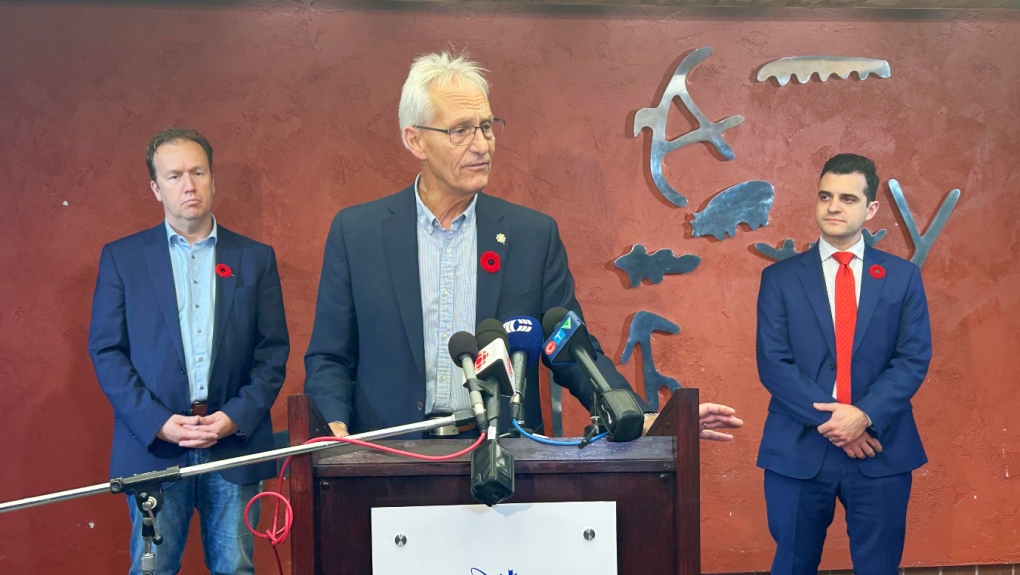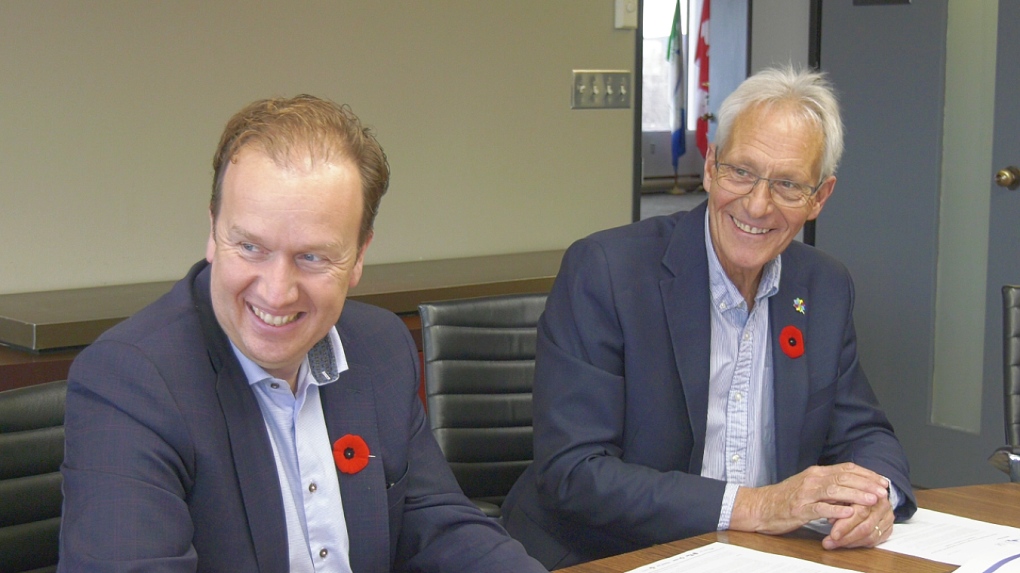Northern Ont. mayors call for help with homelessness, addictions and immigration
Mayors of the five largest cities in northern Ontario met in North Bay the last two days to discuss a range of critical issues impacting their cities and the region.
The mayors of Sudbury, Timmins, Sault Ste. Marie, North Bay and Thunder Bay said that building relationships with the provincial and federal governments remains at the top of the agenda when it comes to tackling homelessness and immigration priorities for the north.
 The mayors of Sudbury, Timmins, Sault Ste. Marie, North Bay and Thunder Bay said that building relationships with the provincial and federal governments remains at the top of the agenda when it comes to tackling homelessness and immigration priorities for the north. (Eric Taschner/CTV News)
The mayors of Sudbury, Timmins, Sault Ste. Marie, North Bay and Thunder Bay said that building relationships with the provincial and federal governments remains at the top of the agenda when it comes to tackling homelessness and immigration priorities for the north. (Eric Taschner/CTV News)
Flanked by colleagues from Sudbury and Sault Ste. Marie, North Bay Mayor Peter Chirico said he is putting his foot down -- severe challenges in northern Ontario need to be solved now with help from upper levels of government.
"To make sure our citizens and our entire population in northern Ontario are well serviced," Chirico told reporters Friday.
One of the top priorities is pushing the Ontario government to make sure there's a dedicated homelessness and addiction recovery treatment (HART) hub in each major city in the north.
The Ford government recently announced that 19 HART hubs would be put in place across the province at the cost of $378 million.
Ten new hubs will be built, while the other nine others will be created by converting former safe consumption sites.
The hubs are meant to connect people with complex homelessness, mental health and addiction challenges to a "comprehensive locally based approach to treatment that will offer an array of services."
 The mayors of Sudbury, Timmins, Sault Ste. Marie, North Bay and Thunder Bay said that building relationships with the provincial and federal governments remains at the top of the agenda when it comes to tackling homelessness and immigration priorities for the north. (Eric Taschner/CTV News)
The mayors of Sudbury, Timmins, Sault Ste. Marie, North Bay and Thunder Bay said that building relationships with the provincial and federal governments remains at the top of the agenda when it comes to tackling homelessness and immigration priorities for the north. (Eric Taschner/CTV News)
 The mayors of Sudbury, Timmins, Sault Ste. Marie, North Bay and Thunder Bay said that building relationships with the provincial and federal governments remains at the top of the agenda when it comes to tackling homelessness and immigration priorities for the north. (Eric Taschner/CTV News)
The mayors of Sudbury, Timmins, Sault Ste. Marie, North Bay and Thunder Bay said that building relationships with the provincial and federal governments remains at the top of the agenda when it comes to tackling homelessness and immigration priorities for the north. (Eric Taschner/CTV News)
"They’ve made it easy for us. This is what we have available, and this is what we’re going after," said Sault Mayor Matthew Shoemaker.
Statistics show the five major cities in the north have the highest opioid mortality rates in the province and are facing the challenge with little support from the province.
"The further you get away from Queen’s Park, the more dire the situation becomes," Shoemaker said.
"I think the fact that it’s not happening at the door at Queen’s Park makes it less visible."
The mayors are also calling for an expedited launch of the Rural Community Immigration Pilot and to make it permanent to address regional labour shortages.
The strategy, the mayors said, aligns with their broader vision of a where economic opportunity, public safety and quality of life coexist in the north.
Immigration fight
That fight is going to be with the federal government, which is cutting the number of permanent immigrants by at least 20 per cent from its previous target of 500,000.
"Let’s not paint the entire country with one brush," said Chirico.
"(In) the large urban centres, it is out of control, but in rural and northern Canada, that’s not the case."
A big problem is that cities often have to compete with each other because of the limited funding to tackle these challenges.
- Download the CTV News app now
- Get local breaking news alerts
- Daily newsletter with the top local stories emailed to your inbox
"The needs are just not our municipality. It's the regions that we have, as well. That's kind of the unique difference between northern and southern Ontario," said Sudbury Mayor Paul Lefebvre.
"You can drive an hour and you can get services … in ways that they want. We don't have that luxury here.”
The path forward, the mayors said, is simple. They plan to send their concerns to their provincial and federal representatives, as well as reach out to ministers who work with addictions, mental health and immigration to have their voices heard.
"To help northern Ontario thrive, we need stronger social programs to tackle the opioid crisis and a focus on job growth," Timmins Maor Michelle Boileau said in a statement.
"By investing in our people and safety, we’re setting up Timmins and the entire north for a healthier, more prosperous future."
A draft of their proposal will also be sent to Ontario Premier Doug Ford’s office.
CTVNews.ca Top Stories
Raised in Sask. after his family fled Hungary, this man spent decades spying on communists for the RCMP
As a Communist Party member in Calgary in the early 1940s, Frank Hadesbeck performed clerical work at the party office, printed leaflets and sold books.
Bird flu, measles top 2025 concerns for Canada's chief public health officer
As we enter 2025, Dr. Theresa Tam has her eye on H5N1 bird flu, an emerging virus that had its first human case in Canada this year.
DEVELOPING Body found in wheel well of plane at Maui airport
A person was found dead in the wheel well of a United Airlines flight to Maui on Tuesday.
Police identify victim of Christmas Day homicide in Hintonburg, charge suspect
The Ottawa Police Service says the victim who has been killed on Christmas Day in Hintonburg has been identified.
Christmas shooting at Phoenix airport leaves 3 people wounded
Police are investigating a Christmas shooting at Sky Harbor Airport in Phoenix that left three people injured by gunfire.
Ship remains stalled on St-Lawrence River north of Montreal
A ship that lost power on the St. Lawrence River on Christmas Eve, remains stationary north of Montreal.
Finland stops Russia-linked vessel over damaged undersea power cable in Baltic Sea
Finnish authorities detained a ship linked to neighboring Russia as they investigate whether it damaged a Baltic Sea power cable and several data cables, police said, in the latest incident involving disruption of key infrastructure.
Your kid is spending too much time on their phone. Here's what to do about it
Wondering what your teen is up to when you're not around? They are likely on YouTube, TikTok, Instagram or Snapchat, according to a new report.
Bird flu kills more than half the big cats at a Washington sanctuary
Bird flu has been on the rise in Washington state and one sanctuary was hit hard: 20 big cats – more than half of the facility’s population – died over the course of weeks.
































